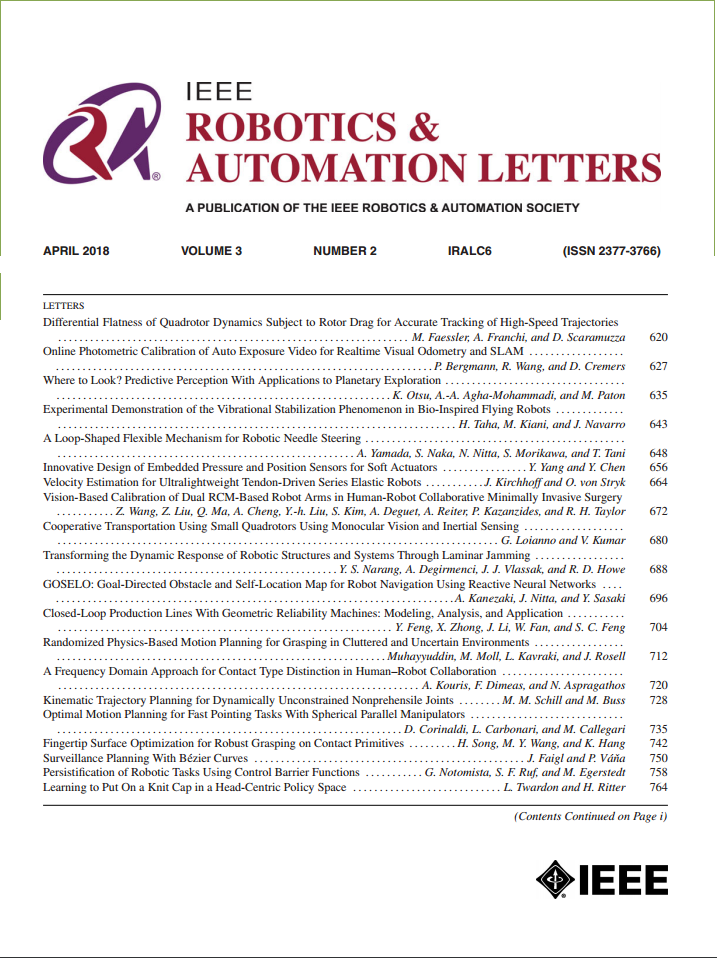Storm: An Experience-Based Framework for Robot Learning From Demonstration
IF 4.6
2区 计算机科学
Q2 ROBOTICS
引用次数: 0
Abstract
Learning from demonstration (LfD) can be used to increase the behavioural repertoire of a robot, but most demonstration-based learning techniques do not enable a robot to acquire knowledge about the limitations of its own body and use that information during learning. In this letter, we propose Storm, an LfD framework that enables acquiring trajectories in high-dimensional spaces, incorporates collision awareness, and can be adapted to different robots. Storm combines a collection of modules: i) robot embodiment exploration using motor babbling in order to acquire knowledge about the robot's own body, stored in the form of joint-specific graphs that encode reachable points and reachability constraints, ii) human-robot model mapping based on which human skeleton observations are mapped to the robot's embodiment, and iii) demonstration-based trajectory learning and subsequent reproduction of the learned actions using Gaussian mixture regression. We validate various aspects of our approach experimentally: i) exploration with different numbers of babbling points for three distinct robots, ii) path planning performance, including in the presence of obstacles, and iii) the acceptance of reproduced trajectories through a small-scale, real-world user study. The results demonstrate that Storm can produce versatile behaviours on different robots, and that trajectory reproductions are generally rated well by external observers, which is important for overall user acceptance.Storm:一个基于经验的机器人学习示范框架
从演示中学习(LfD)可以用来增加机器人的行为技能,但大多数基于演示的学习技术不能使机器人获得关于其自身身体局限性的知识,并在学习过程中使用这些信息。在这封信中,我们提出了Storm,这是一个LfD框架,可以在高维空间中获取轨迹,包含碰撞感知,并且可以适应不同的机器人。Storm结合了一系列模块:i)使用电机babbling进行机器人化身探索,以获取关于机器人自身身体的知识,以编码可达点和可达性约束的关节特定图形的形式存储,ii)基于人类骨骼观察映射到机器人化身的人-机器人模型映射,iii)基于演示的轨迹学习和随后使用高斯混合回归学习动作的复制。我们通过实验验证了我们方法的各个方面:i)为三个不同的机器人使用不同数量的咿呀学语点进行探索,ii)路径规划性能,包括存在障碍物的情况,以及iii)通过小规模的真实用户研究接受再现轨迹。结果表明,Storm可以在不同的机器人上产生多种行为,并且轨迹再现通常被外部观察者评为良好,这对于整体用户接受度很重要。
本文章由计算机程序翻译,如有差异,请以英文原文为准。
求助全文
约1分钟内获得全文
求助全文
来源期刊

IEEE Robotics and Automation Letters
Computer Science-Computer Science Applications
CiteScore
9.60
自引率
15.40%
发文量
1428
期刊介绍:
The scope of this journal is to publish peer-reviewed articles that provide a timely and concise account of innovative research ideas and application results, reporting significant theoretical findings and application case studies in areas of robotics and automation.
 求助内容:
求助内容: 应助结果提醒方式:
应助结果提醒方式:


